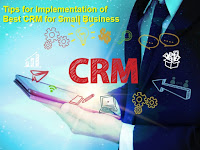 In case you are on the verge of
taking a call on whether to implement an ERP system for your business or simply
thinking in terms of up gradation of
existing systems, it is easy to be bewildered by the plethora of options
available. This holds true especially for ERP for Manufacturing Industry as this segment is catered to by a number of
players.
In case you are on the verge of
taking a call on whether to implement an ERP system for your business or simply
thinking in terms of up gradation of
existing systems, it is easy to be bewildered by the plethora of options
available. This holds true especially for ERP for Manufacturing Industry as this segment is catered to by a number of
players.
But all things not being equal,
it is only natural that some ERPs will tend to suit your business activities
more than others specifically when you consider particular fields in which the
activity of manufacturing takes place. You need to pay attention to how the ERP
looks after the control of production, how it enables adherence to stringent
levels of quality. It should also effectively manage inventory and materials.
Comparatively larger business may have a number of plants and operate from
several sites. Do consider process manufacturing vis-à-vis discrete manufacturing. Your ERP needs to effectively
govern all of these.
The manufacturing sector in India
is projected to reach the US $1 trillion
by the year 2025. It is expected that 25 to 30 % of the GDP of the country
would come from manufacturing and would create about 90 million jobs. So,
manufacturing is a sector that has a large
potential for your business. And to optimize your operations you need an ERP.
Here are the essentials you want in such a software.
Shop Floor Control or Management
By virtue of shop floor control,
you get a database of all the activities going on,
on the shop floor in real-time. Such
activities are inclusive of new work or work in progress and work that has
already been completed. Throughout the variety of processes undergone during
the manufacturing, you get real-time feedback that enables you to respond
promptly to emerging issues.
MRP or Materials Planning and
Costing
This lets you forecast or schedule products. It comes up with
a comprehensive material plan which gives you detailed information on the
quantity and the delivery schedule of all the necessary components.
EDI or Electronic Data
Interchange
This digital process facilitates
the invoicing processes, order entry and even goes to the extent of looking
after the shipping notice process with granular precision. Conventional filings
and forms in the paper medium are made obsolete. Transmission of data is made
instantaneous rather than through the mail.
Management of Quality
By management of quality,
manufacturers are able to keep an eye on the quality of products produced by
the process of manufacturing.
Kanban or Lean
These terms refer to the system
of communication that regulates the shop flow and keeps the production levels
and customer demand in sync with each other.
Image Source : http://bit.ly/2lpYsBR

